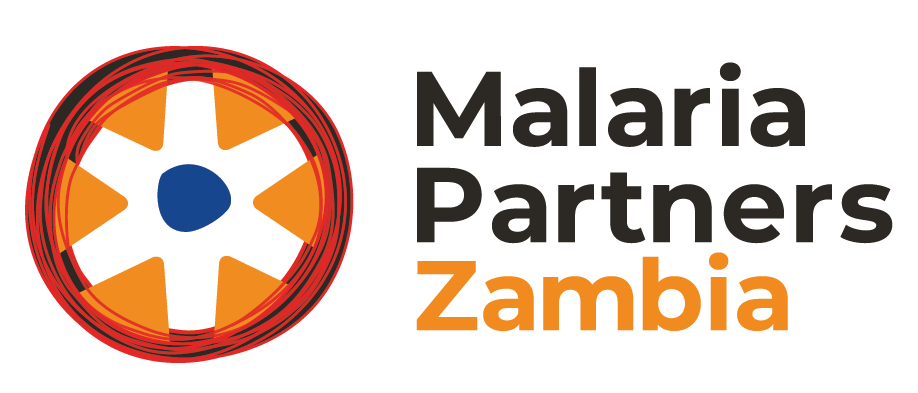Stuck in London – While Mentoring Community Health Workers
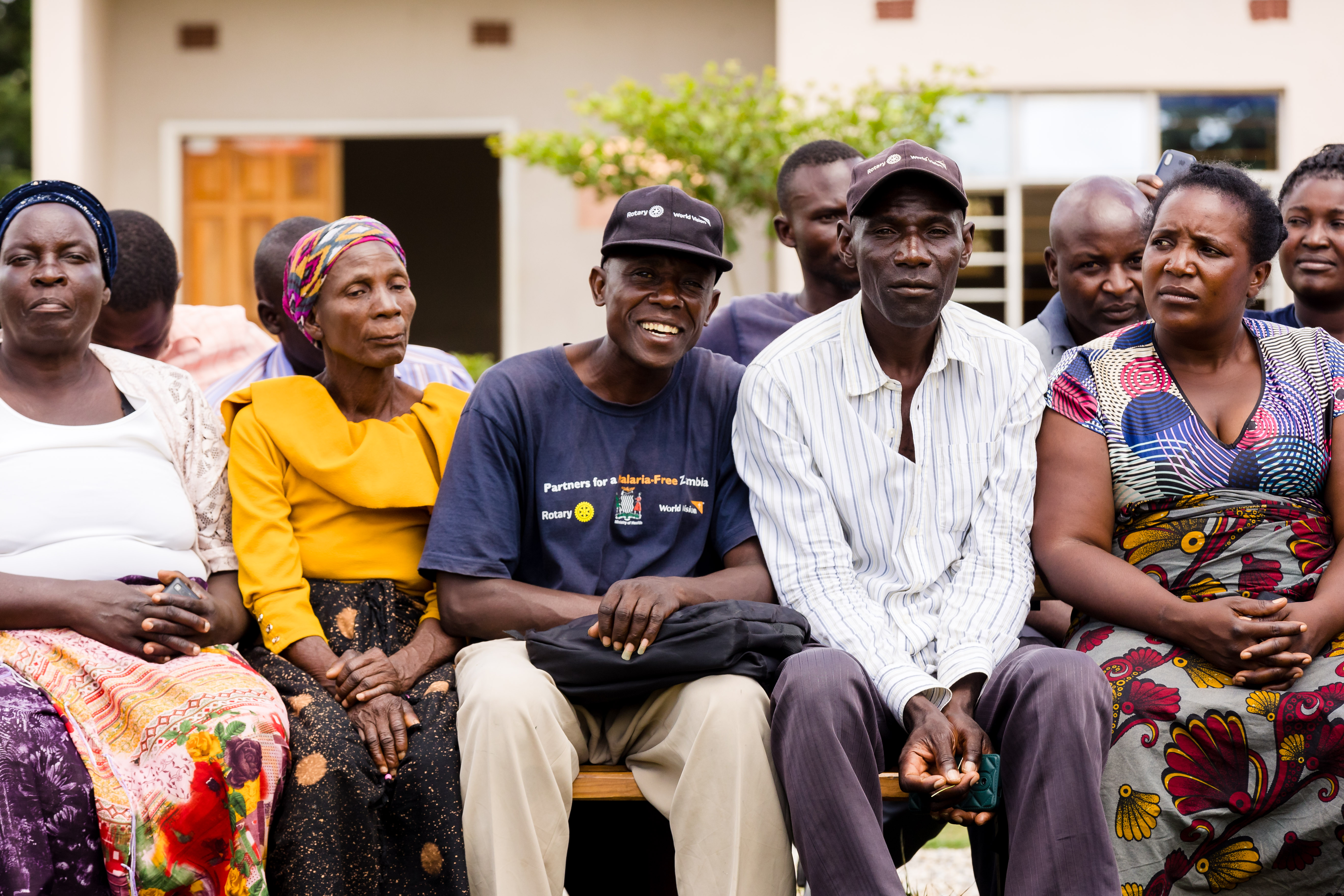
admin September 30, 2023 By Eric Liswaniso, Programs Manager, Malaria Partners Zambia and Wongani Zulu, Malaria Surveillance Specialist, World Vision Zambia “Eric, did you know this place is called London?” remarked Kelvin, the District Surveillance Officer for Lavushimanda district, to my astonishment. We all had a laugh about it. This place couldn’t be further from London in every sense. The time was past 8pm and the only light we had was coming from the headlamps of our Toyota Landcruiser which was now stuck in the mud. We were stuck in London! Muwele Rural Health Center (RHC) has about 23 community health workers (CHWs). Of the 23, 4 are what we call data CHWs. These are responsible for recording data from the registers of all the 23 into the national District Health Information System (DHIS2) database using the smart phones we provide them with. It is necessary to review malaria data for accuracy from time to time, for evidence-based decision making. Muwele RHC was one of 10 facilities receiving Mentorship and Technical Supportive Supervision (MTSS) in Lavushimanda district in January. Ministry of Health experts together with project staff and Rotarians from the Rotary Club of Kasama and Rotaract Club of Ndola visited all 10 facilities in Lavushimanda. During MTSS the data is reviewed with the CHWs themselves and errors identified and corrected immediately. The idea is to help them appreciate the value of accurate data for decision making and the important role they play in this process. The team of experts also provides one-on-one technical support to the CHWs to help them improve where weaknesses in data management are identified. The exercise is important because it cleans up data while improving CHW performance. At the same time, the process helps participating Rotarians to appreciate other facets of the fight to end malaria. Oh, and back to London, its murky mud could not hold us back. Despite our exhaustion from reviewing 12 months of malaria data reported by each of the 23 CHWs at Muwele RHC, we summoned our collective mental faculties and physical strength to wedge branches under the tires of the vehicle. After about an hour, we managed to get it unstuck. And two hours later, we were back at base at a cultural village in Chiunda Ponde, home to the famous Shoebill Stork –story for another day. Rotaractor Lucky Chisanga and Rotarian Stella Gaviao conducting MTSS at Muwele RHC 20230116_194107 Muwele RHC MTSS Project vehicle AKA Joseph stuck in the murky mud of Muwele
Mansa Malaria Eradication Project
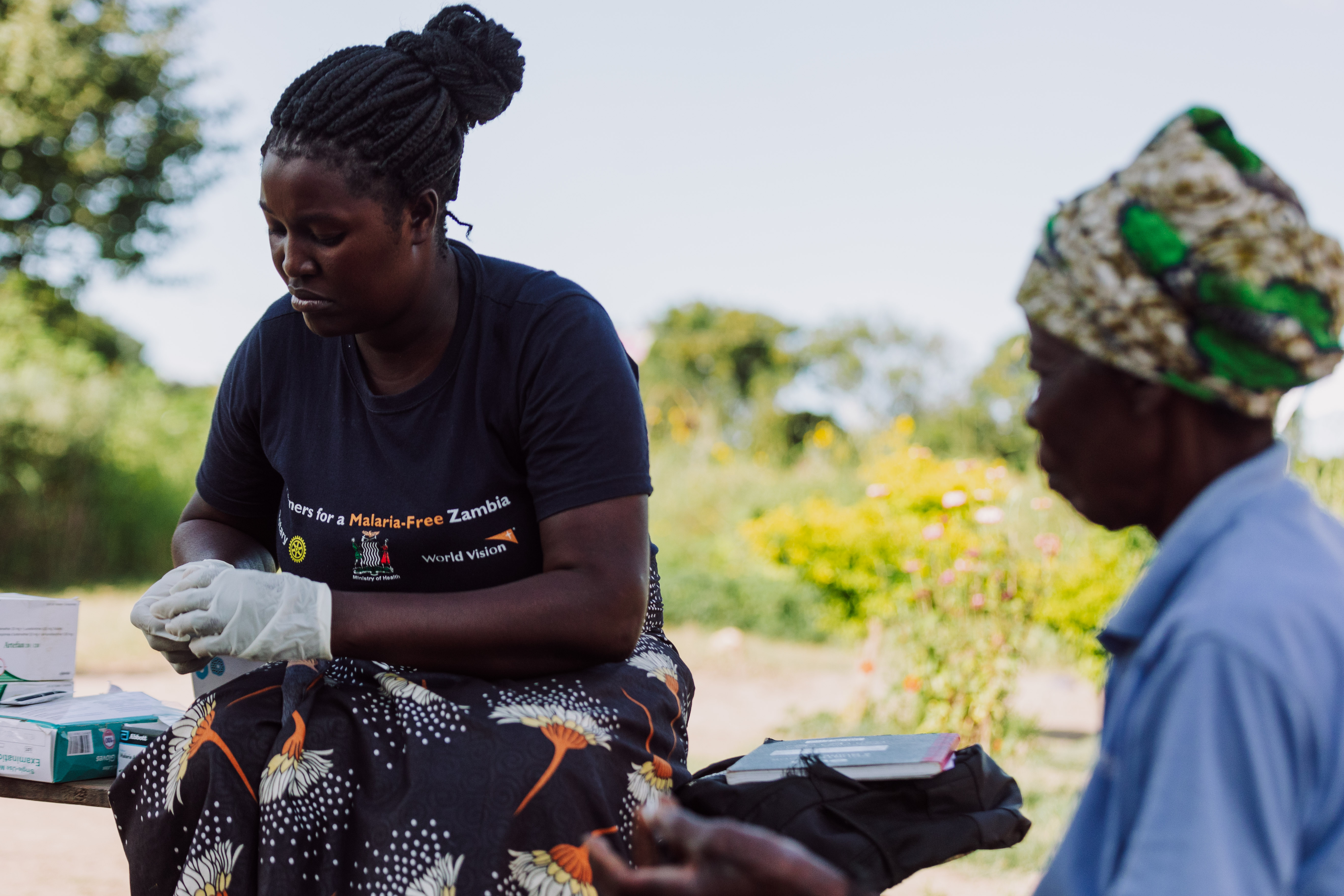
In July 2017, the Rotary Club of Mansa launched its project to prevent malaria by providing bed nets and malaria prevention education to five boarding schools and inmates at the Mansa Corrections facility – a total of more than 2,500 beneficiaries
Announcing Rotary Healthy Communities Challenge

admin September 29, 2023 Rotary International President, Gordon McInally, announced this weekend that, in partnership with the Bill & Melinda Gates Foundation and World Vision, Rotary is launching the Rotary Healthy Communities Challenge. This initiative will provide $30 million to combat malaria, diarrheal diseases, and respiratory infections, which are the leading causes of death among children under five years old, in four Sub-Saharan African countries: Zambia, Nigeria, Mozambique, and the Democratic Republic of Congo. “I have some exciting news to share. The success of Partners for a Malaria-Free Zambia (PMFZ) led to an opportunity to leverage our strategic partnership with the Bill & Melinda Gates Foundation and World Vision to create a new disease prevention and treatment program which we are calling the Rotary Healthy Communities Challenge, which will be implemented in four countries from 2024 to 2027,” said Rotary International President McInally. “Through this program, Rotary is helping to strengthen community health care systems to reduce severe disease and death in the participating countries and ensure that the local communities have access to quality healthcare.” Members of the Malaria Partners International (MPI) team, including Jeffrey J. Pritchard, CFP, Adriana Lanting, James Moore and Jenny Andrews attended the All-Africa Rotary Zone Institute in Lusaka, Zambia where the announcement was made. They were joined by members of the Malaria Partners Zambia (MPZ) team, Martha Lungu FCCA, AZICA and Eric Liswaniso, who, along with colleagues from World Vision, provided hands-on implementation of the Community Health Worker (CHW) training through Partners for a Malaria-Free Zambia. All Posts News and Updates Announcing Rotary Healthy Communities Challenge September 29, 2023/ admin September 29, 2023 Rotary International President, Gordon McInally, announced this weekend that, in partnership with the Bill & Melinda Gates Foundation and World Vision, Rotary… Read More Malaria Partners Training Certificates September 11, 2023/ We successfully offered training and certifications to locals and health personnel on the best practices of malaria prevention. Read More Vaccination at Ndola basic September 5, 2023/ We successfully offered training and certifications to locals and health personnel on the best practices of malaria prevention. Read More
Community Health Workers: What’s in Their Bag?
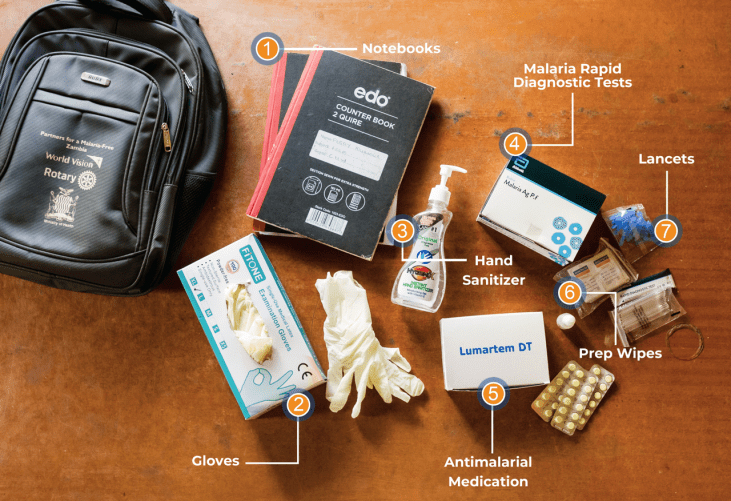
admin September 29, 2023 Community Health Workers (CHWs) are volunteer healthcare workers who provides basic health care and health education to their home villages. They are selected and recruited by their communities’ leaders and trained to deliver essential services for malaria, diarrhea, and respiratory illnesses, playing a vital role in rural healthcare delivery. On completion of their formal training, CHW are equipped with backpacks, rapid diagnostic test kits, medicines, health education materials, rain gear, shirts and hats, PPE, cell phones, and robust bicycles. CHWs’ ability to carry out these tasks effectively is critical as they act as a frontline healthcare resource in remote areas where access to formal healthcare facilities may be limited. Their presence and timely interventions play a significant role in reducing the burden of malaria, diarrhea, and respiratory illnesses in their communities. The supplies they carry are carefully selected to empower them with the necessary tools to deliver quality care and contribute to the overall health and well-being of their communities. Community Health Workers: Their Supplies 1. Notebooks: Notebooks are used for collecting information and maintaining records. CHWs record the results of RDTs, patient information, treatment provided, and any other relevant health data. These records are crucial for monitoring patients’ progress and sharing data with the healthcare system. 2. Gloves: Gloves are essential personal protective equipment (PPE) that CHWs wear when conducting medical procedures, such as using lancets or administering medications. Gloves help prevent the transmission of infections between the CHW and the patient. 3. Hand Sanitizer: Hand sanitizer is used to maintain hand hygiene, especially when access to soap and water is limited. CHWs often work in remote areas where proper handwashing facilities may not be available, so hand sanitizer helps reduce the risk of spreading infections. 4. Malaria Rapid Diagnostic Tests (RDTs): RDTs are used to detect the presence of malaria parasites in a patient’s blood. CHWs are trained to conduct these tests, interpret the results, and identify positive, negative, or invalid cases. This allows them to diagnose malaria promptly and provide appropriate treatment or referrals. 5. Lumartem DT (Artemether-Lumefantrine): Lumartem DT is an antimalarial medication used for the treatment of uncomplicated malaria cases. When CHWs identify RDT-positive cases without clinical complications, they can administer Lumartem DT to provide timely treatment. 6. Alcohol Prep Pads: Alcohol prep pads are used to disinfect the skin before any procedure, such as pricking the finger for blood collection. This helps minimize the risk of infections at the site of the procedure. 7. Lancets: Lancets are small, sterile needles used for a pinprick to draw a drop of blood. CHWs use these lancets to collect blood samples for Malaria Rapid Diagnostic Tests (RDTs). The ability to perform RDTs is crucial for diagnosing malaria cases accurately. Community Health Workers: Additional Information In Zambia, CHWs are typically in their mid-forties, farmers, average nine years of education, and are married. In two recent Rotary CHW training projects in the Copperbelt, women and men were roughly equal in number. CHWs are given formal training for six days + one field day, in classes of 30 to 40. The training applies a standard curriculum of Integrated Community Case Management Plus (iCCM+) developed by the Ministry of Health and delivered by experienced National, Provincial and District Health trainers. The CHWs are trained in how to conduct a pin prick, draw a drop of blood and dispense it onto a Rapid Diagnostic Malaria Test (RDT) plate. They learn how to read the result, if positive, negative or invalid and how to record the result. For the RDT positive cases without clinical complications, they provide treatment medicines. For positive cases with clinical complications, the CHWs stabilize and refer the patient to the closest rural health centre/health post or to a hospital if intensive treatment is required. The “+” in iCCM+ means that a positive test result requires the testing of family members and neighbors within a defined radius–to eliminate the human reservoir of the malaria parasite within that immediate area. On completion of their formal training, CHW candidates are then attached to health facilities closest to their home communities for a six-week practicum and mentorship with an assigned supervisor. Their core competences are assessed and those that meet the standard are deployed to their respective communities to offer community case management services, whereas those that do not meet the basic competences stay attached to facility until they achieve the necessary capabilities. Community Health Workers Learn more
Partners for a Malaria-Free Zambia Retrains Community Health Workers

admin July 25, 2024 By Eric Liswaniso, Programs Manager – Malaria Partners Zambia Malaria Partners Zambia through the Partners for a Malaria-Free Zambia project has successfully completed the retraining exercise for community health workers (CHWs) who were trained in 2021 in Muchinga province. The retraining was necessary to ensure that the CHWs are up-to-date on the latest malaria prevention and treatment methods. The trainings which commenced in May this year were conducted over two weeks intervals. Rotarian volunteers provided administrative support and encouragement to the CHWs. The retraining was a success, and the CHWs are now better equipped to provide malaria prevention and treatment services to their communities. Following the successful retraining exercise, the project has also trained replacements for all CHWs who have dropped out across all 4 districts its supporting in Muchinga province. The most common cause of dropouts in Muchinga has been death and in some instances relocation and employment. The retraining of the CHWs is a major milestone for the Partners for a Malaria-Free Zambia project. It ensures that the project is on track to achieve its goal of significantly reducing the malaria burden in the 10 districts of intervention in Zambia. Rotarians Support Malaria Elimination Rotarians have been instrumental in the success of the Partners for a Malaria-Free Zambia project since its inception in 2021. They have provided tremendous administrative support and encouragement to the CHWs. More Rotary and Rotaract clubs are now considering undertaking malaria elimination projects following the successful small grant award to the Rotaract Club of Lusaka’s RotarACTION project. The support of Rotarians is essential to the success of the Partners for a Malaria-Free Zambia project. It is a testament to the commitment of Rotarians to fighting malaria and making a difference in the lives of people in Zambia. About the Partners for a Malaria-Free Zambia Project The Partners for a Malaria-Free Zambia project is a $6 million project that is funded by Rotary International, the Bill & Melinda Gates Foundation, and World Vision US. The project is co-implemented by Malaria Partners Zambia and World Vision Zambia. The project trained and deployed 2500 CHWs in Muchinga and Central provinces. The CHWs have been trained to provide malaria prevention and treatment services to their communities. The project is contributing to strengthening the national malaria elimination program. The Partners for a Malaria-Free Zambia project is a major step forward in the fight against malaria in Zambia. The project is saving thousands of lives and improving the health of millions of people.
Empowering Mkushi: My journey as a Rotaract Volunteer Combatting Malaria alongside Malaria Partners Zambia and World Vision Zambia
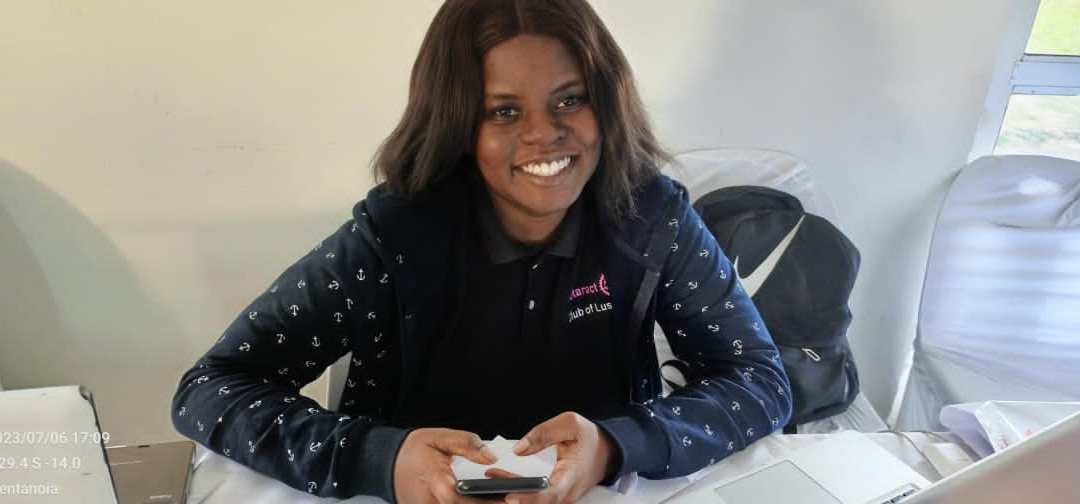
admin July 25, 2023 An Article by Towela Makala Ndovie, Rotaract Volunteer, Zambia Rotaractor Kaoma Kaoma called me and asked, “Would you want to volunteer with MPZ and help out in Mkushi district?” That was how it all began. At first, I was hesitant since I had never taken a bus outside of Lusaka, I didn’t speak the language, and I was travelling as a solo female. But I took a leap of faith and said, “Cool.” The next day, I receive a call from Eric Liswaniso, the Programs Manager for Malaria Partners Zambia, who informs me of the program and answers all of my inquiries about everything from culture to travel logistics. He also provides me with the contact information for two former volunteers from the Rotaract Club of UNZA, Louise C. and Alfred C. so I can hear their accounts of the experience on the project. The following day, I was prepared to leave with my bags packed. On the day of my trip, everything was ready; all I had to do was reserve my Yango (our version of Uber) and head off. Alas, my key decided it wasn’t ready to let me leave, leaving me trapped inside. Whether this was a sign or simply the result of Lusaka’s chilly weather freezing my key to the door, we will never know. So, since I missed my direct bus to Mkushi, I had to take a different route that went first to Kapiri, then to Mkushi. I’m sure the other travelers and drivers were perplexed as to why this girl was asking at each station, “Is this Kapiri?” or “Is this Mkushi?” Unaware that this female has a history of missing stops, but nevertheless experiencing Zambia’s legendary friendliness and generosity, this girl made it safely to Mkushi after a grueling 8-hour journey. Arriving in Mkushi Mr. Moses Mambwa, the World Vision Provincial Coordinator and Beene B., a fellow Rotaractor from the Rotaract Club Ndola Mukuba picked me up at the Mkushi station. Over the course of the next seven days, we would collaborate to learn more about malaria and to become change agents in our individual areas. It was very exciting to hear about the progress that this program has made in the community regarding educating community health workers and providing them with tools in order to understand malaria and be agents of change in Mkushi. I must add that networking is also a part of this experience as I got to meet amazing people who are passionate about ending malaria in Zambia like Mr. Tadious Chibomba the Ministry of Health representative and Mr. Chisombe the Provincial Health Office representative for Central Province, both of whom I had very fun and engaging conversations with. Soon after dinner – lights out began the moment my head struck the pillow! On a chilly and windy morning, Mr. Mambwe drove Beene and I to our first destination where we met with another team of very dedicated trainers from the Ministry of Health. We helped with data handling and marking of test papers for the 35 Luano participants training to become community health workers. After lunch, I sat down with the organizers and we had more interesting discussions under a tree. Later, the team met with the community volunteers to get their thoughts about the program and the impact it was having on the community. The next day, I was taken to a new location where 29 other community health workers from Luano were also being trained. Here again, I got to meet more interesting personalities from the Ministry of Health. Beene and I were again tasked with data entry duties before continuing with the training seminar where got to learn more about malaria. I can brag here that Beene and I took the pre-test and scored 100% on our tests, which is evidence of the superior teaching techniques used by facility staff to educate the community. Fast forward and in a flash, graduation day was here. After days of immersing myself in the learning, it was time to witness the graduation ceremony. More than 90’% of the class obtained 100% in their post test results and the educators were comfortable sending out into the community to serve their neighbors. As I departed Mkushi community, I gained a new perspective on who I am as a person. Not only did I gain more knowledge of my Zambian roots, but I made new connections from different walks of life. The dedication of the National Malaria Elimination Center, provincial, district, and facility staff, Rotary international and the community health workers all had a profound effect on my life. The malaria elimination program in Zambia will forever have a mark on my life. Natotela Mkushi! Thank you Mkushi!
Rotary District 9210 District Conference in Mozambique
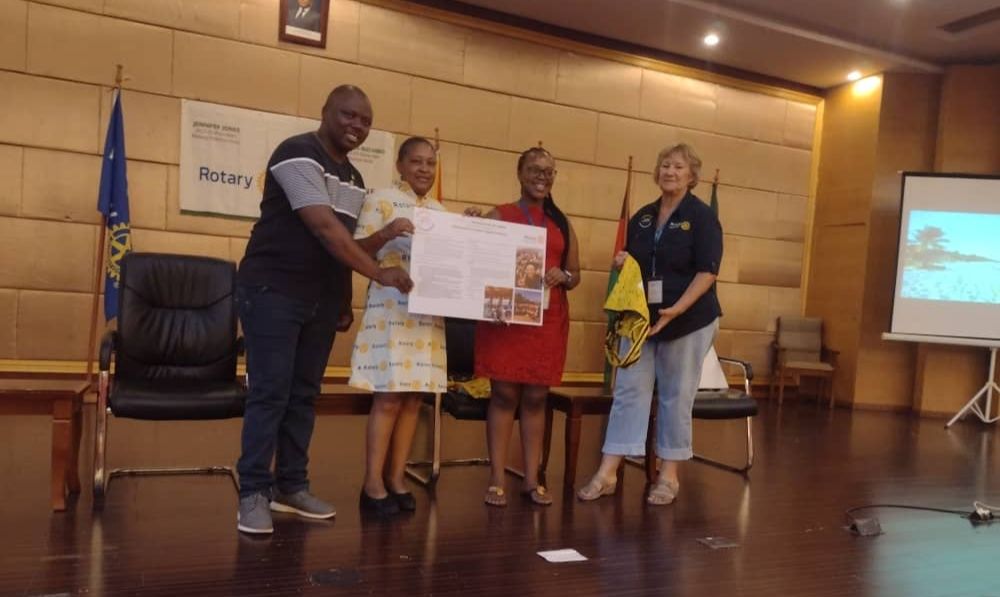
admin May 25, 2023 The annual Rotary conference brings together all Rotarians and Rotaractors from District 9210 to network and showcase various Rotary projects. ‘Discon’ was well attended with many delegates from outside the district, 25 clubs presented at the projects fair. Rotaract club of Lusaka was voted Best Project for their Malaria project in the Luano district. Eric Liswaniso (POS Manager) presented on behalf of the Rotaractors! RC Mufulira receiving an award for the presentation on Malaria Projects. “We also amplified the voice of these projects..and am quite happy that we did come to this Discon! Already, the 2 Rotaractor Clubs in Lusaka are very interested & will hit the ground running soon after this.” -Modestine Kaoma, member of the Rotary Club of Mufulira and co-chair of Malaria Partners Zambia (MPZ).
The Rotaractors in Action Against Malaria Project
admin September 30, 2023 By: Eric Liswaniso, Programs Manager, Partners for a Malaria-Free Zambia Project, Malaria Partners Zambia Malaria work is fulfilling work. Every Rotarian volunteer we’ve worked with on the Partners for a Malaria-Free Zambia project leaves impacted in one way or another. For me, it’s fulfilling to be able to give Rotarians and Rotaractors an opportunity to witness firsthand, the impact this work is yielding in the communities we serve. The Rotaract Club of Lusaka is one of the clubs that has been very supportive of our work. Their enthusiastic and energetic members have volunteered to support our trainings, data management activities, and several other interventions. Eager to learn, they ask a lot of questions, and we as the project team do our best to create an atmosphere of learning by encouraging close engagement between the volunteers and the experts we work with. This helps Rotarians and Rotaractors gain greater perspective into the ins and outs of the fight to eliminate malaria. We also educate the volunteers on Rotary’s extensive malaria elimination efforts and the many opportunities for collaboration with Rotary clubs across the globe and funding for malaria work. The leadership of the Rotaract Club of Lusaka through their President Tasha Chongo took us to task on the latter, having learnt about Malaria Partners International’s small grants program. They wanted to know how they could get involved in the fight and contribute their youthful energy and zeal to ending a scourge that every Zambian is all too familiar with. We responded by linking them to health experts in the malaria space who helped them identify opportunities for collaboration and support within the malaria elimination program. This long consultative process culminated into what is the now dubbed the Rotaractors in Action Against Malaria Project – RotarACTION. Armed with information, the young Rotaractors crafted an ambitious proposal to embark on a data management project intended to help resolve data issues identified in one of the PMFZ-supported districts through data audits, mentorship and provision of onsite technical support to the community health workers and health center staff. This USD$13, 000 project would also pilot the introduction of standardized registers for use by the health facilities in Luano district, with a view to ignite the rolling out of the same countrywide. The Rotaractors understand the importance of accurate and reliable data to effective decision making. Partnership is in our name for a reason. That is why Malaria Partners International went a step further than just financing the work. They linked the Zambian Rotaractors to like-minded young people in the United States and Germany. The Interact Club of St. Isabela in Santa Rosa California have since raised up to USD$2, 000 towards the work in Luano district with the Rotaractors of District 18 in Germany also working towards a significant contribution to the work. The work has begun in earnest with sensitization activities such as the Malaria Mondays where the club puts out important malaria awareness information through their social media to educate the public about malaria. As someone whose days are spent grappling with how we can combat malaria in our beloved country, I am thrilled about the prospects of working with the Rotaract Club of Lusaka in this fight. And I hope this step taken by the club will spur others on to apply for funds to strengthen malaria elimination efforts in Zambia. I’ll be back soon with results of this project, but for now I’m off to participate in RotarACTION! Join the Fight to End Malaria Today: Donate Now
Munada – The Village Market

admin September 30, 2023 By Eric Liswaniso, Programs Manager, Malaria Partners Zambia In all my travels to some of the remotest parts of Muchinga province, monitoring our malaria elimination work, I have always wondered where and how the residents of these villages get their essential amenities from; seeing as there’s seldom any shops or markets around in most cases. Getting to the rural health centers we support usually takes long hours of driving through rough terrain and is particularly harder during the rainy season. While the ride is for us an adventure, I often find myself wondering just where do they get their clothes, replacement parts for bicycles, food, etc.? As part of our social behavioral change communication efforts in Muchinga, we travel to remote communities to create awareness about malaria through drama and cultural dances. We also use the time to bring awareness to the work of the community health workers, explaining the very important role they play in delivering quality healthcare to their neighbors. Zambians love to dance. The drum beat sounds, accompanied by some sweet traditional Zambian songs, and in no time crowds gather. At the height of the musical euphoria, the District Health Promotions Officer (DHPO) interrupts proceedings with his loud megaphone to address the gathered masses with malaria prevention and control messages. He explains how malaria is transmitted, how it can be prevented and how it is treated in simple layman terms. Using the local language of the area, he also ceases the moment to sensitize the community on the current cholera outbreaks in selected parts of the country. He warns them to take necessary precautions to prevent the disease from reaching their community. Covid-19 messaging is also a mainstay at all public gatherings, lest communities drop their guard. The Munada is a monthly community market where local and visiting traders bring their merchandise to the local community to sell. Once every month, the community has an opportunity to buy all the essential necessities they cannot find locally. Much like an urban thrift market, the Munada is a fun and engaging activity. The district health management team loves to target these events for community engagements. And we were lucky to be part of 2 fun-packed Munadas in Shiwang’andu district this February. Now I know where they get all the good stuff they need. Onto the next one.
